“Do something positive for this planet”
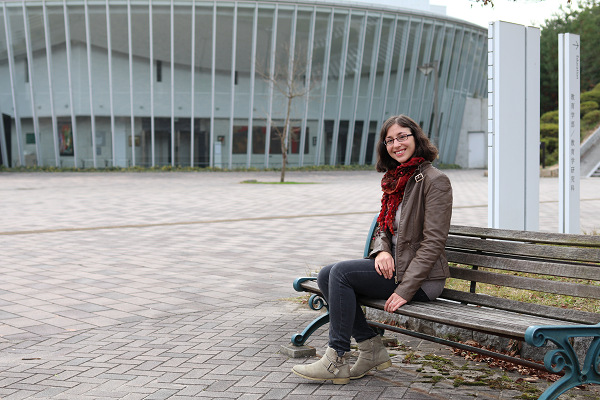
Name: Simona Zollet
Home Country/Region: Italy
Affiliation: TAOYAKA Program for Creating a Flexible, Enduring, Peaceful Society (5-year integrated PhD program)
Hobbies: Growing organic vegetables, cooking, baking, wine and cheese tasting, and doing crafts
(Date of Interview: Nov. 30, 2016)
What is your hometown like?
My hometown is called Feltre, a comune (the smallest civil administrative unit in Italy) of the province of Belluno in Veneto, north-eastern part of Italy. The town itself is small but very famous as a historical town. We have a lot of houses from the Renaissance period, paintings and frescoes on the wall, so it’s really famous for art tourists.
We have a big event in summer called Palio, it’s basically a recreation of Middle Ages games. We have horse race, archery, games involving the whole city. People in the city are divided into 4 teams and they compete for the prize. We also have a parade where people dress up in Middle Ages costumes and events related to the Middle Ages. It’s the most famous event in my hometown. The mountains near my hometown are also famous for trekking and winter tourism activities such as ski and other winter sports. It’s a naturally beautiful area in the mountains.
What are the specialty foods and drinks in your hometown?
One specific type of cheese called Piave is a very famous product of my hometown area. It became famous over the world now because it won some international cheese prizes. As for drinks, Italy is famous for wine but my hometown area was too cold for wine production. Lately, however, the climate is getting a little warmer, so we started growing grapes in my hometown too. The region near my hometown is famous for a wine called Prosecco, so we are starting to grow that kind of grapes too.

I see. By the way, I heard that this is your second time to come and study at Hiroshima University. Why did you decide to come to Japan in the first place?
Well, actually I’ve been interested in Japanese culture for a long time. I studied since I was a kid, I love Japanese anime and music. I also started to learn about the traditional culture of Japan, which I found really interesting.
At the beginning, when I went to college, I was planning to study Japanese Language but then for various reasons, I changed and studied environmental science which is completely different. But I still kept my interests in Japan and finally when I was doing my Master’s degree in Ca’ Foscari University of Venice, I learnt that there was an exchange program between the university and Hiroshima University. So I applied for that program and I was selected. The exchange program was related to environmental sustainability and sustainable development, so I didn’t come here to study Japanese. For one semester I took classes in IDEC (Graduate School for International Development and Cooperation) and after the six months, I went back to my home university.
And now you are back, and studying at TAOYAKA Program (*). What is the main focus of your current study?
Well, rural studies and sustainable agriculture are my research focuses. In particular, right now, I am focusing on doing a comparative study between Italy and Japan. You might have known that Japan has the I-turn and U-turn people, people who lived in the city move or go back to live in the rural areas. I am particularly interested to study people who go back to the rural places and start some small agriculture-related businesses, especially those who focus on sustainable or organic agriculture.
I believe that this kind of activities is really meaningful for rural places. We always think of rural places as unfortunate places where people are depopulating, it’s mostly elderly people living there and the city life is much better. But I actually believe that young people who are going back to the rural places are not satisfied with city life anymore and with what it can offer. They want to re-connect with nature and at the same time to live more meaningful and less stressful lives.
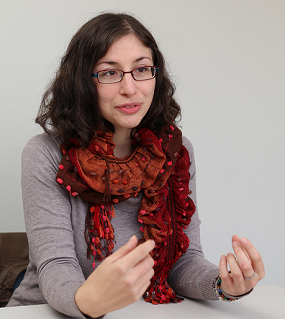
So I want to do my research on this kind of people by looking at their motivation for doing this, and also what kind of positive effects they’re creating by going back to the countryside and engaging in sustainable agriculture, for example. In Italy and Europe, in general, we have the same phenomena, where people go back to rural places. So I want to try to make a comparative study between Italy and Japan and see which kind of cultural aspects are similar or different, and how they are influencing people in their choices.
(*) TAOYAKA Program for Creating a Flexible, Enduring, Peaceful Society. As for details, please refer to the website: http://taoyaka.hiroshima-u.ac.jp/english/
It seems not a single day passes by without hearing the word ‘sustainability’.
Well, if you look at global news, we can see that global problems, especially those related to the environment, environmental pollution, decreasing of natural resources, are getting worse and worse. Until recently, we didn’t really think about the global scale of our actions but now we cannot keep ignoring that our actions have global consequences. So that’s why I think sustainability is important for each one of us because the things we do affect the whole planet, and at the same time, what happens in the planet affects every one of us.
One of the reasons why I focus on the people going back to the rural areas is that I see them as a model of people trying to live more in harmony with the nature, trying to live more sustainably, trying not to use so many resources as we do right now. They grow their own food, or try to live with less. I try to apply this to my own life as well. For example, my fiance’ and I are growing organic vegetables for our own consumption on a small rented piece of land here in Saijo.
Right now, we are consuming a lot of things, but the resources of the planet are not infinite. So we need to start reducing what we consume and live with less, but this doesn’t mean that our lives will be worse than now. For example, if we limit the time and energy we spend on buying things we don’t really need, we can use it for more meaningful things, such as spending time with friends and family, doing something positive for our community, or enjoying nature.
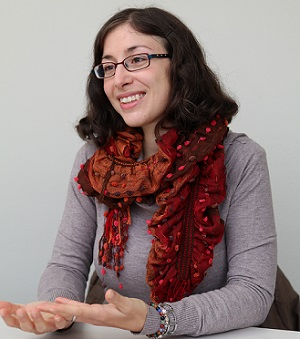
That's true. You mentioned about the I-turn and U-turn people. How do we attract young people into farming?
Well, my focus is on more remote rural areas. Not areas like Saijo but like where we went to in Shimane Prefecture for the TAOYAKA Program, which was in the mountains and where they had a big problem with abandoned farmland. So of course it is not easy to attract many young people to go back to the countryside to start doing farming. But I think now that the economic situation in Japan and also other developed countries in Europe and the U.S. are getting worse, people sometimes have trouble finding jobs in the city, or they feel that even having a 9-to-5 office job is not making them any happier or self-realized. Maybe they want to try to live in a different way but they may not know what to do.
Actually I know that in Japan there are some programs for young people who want to go back to rural areas but don’t know where to start from or what to do. The programs help these people to find land in the rural area, teach them about agriculture, or even small business they can create in rural areas. It’s a slow process, but I think it’s starting. And if we keep focusing on this kind of people, rural areas can flourish again, and at the same time we can create a deeper connection between urban areas and the countryside, which contributes to the overall sustainability of a nation.
That's really a great idea. By the way, I know you are particular about what you eat.
Ah, yeah. I really care about the quality of food, and how to enjoy the food itself. When I was in Italy, I was part of a cultural association events related to cheese tasting, wine tasting, beer tasting, other food tasting, and we make efforts to promote the local products, and teach people how to enjoy the food. Sometimes we eat or drink something but we don’t really enjoy it, or do not know how to appreciate it. For example, Saijo has a lot of sake factories and sake here is really amazing. But if you don’t know anything about how sake is made, or about the differences between different types, then drinking one or another is the same. But if you learn about this kind of things, then you can enjoy it and appreciate any food or drinks much better. And I also like cooking.
And your hobby includes doing crafts, too. What do you make?
When I came back to Japan, my fiance’ introduced me to the pottery class he was attending here in Saijo. I fell in love with it! I especially like to make kitchen utensils and items. I think it’s very satisfying to eat the food you make on the plates and cups you made. I feel really happy thinking that ‘I cooked this food, and I also made the plates’.
It's so-called ‘slow food culture’, right?
Yeah, I would say so. Actually ‘slow food’ is a movement that started in Italy a few decades ago. And it’s against the fast-food culture.
Fast foods such as hamburgers are like global food. You can find the same thing wherever you go in the world. But wouldn’t it be more important to get to know the foods and drinks that are specific to that place? For example, Japan has a lot of different foods in different areas. So rather than going to a fast food restaurant to eat, why don’t we try the local food and get to know it? We should also pay attention to where our food comes from, which includes being aware of whether it was grown in an environmentally sustainable way. The concept of slow food is also in the sense that when you eat something, you shouldn’t do it in a rush. You should take your time to taste the food, to enjoy it, not because you will die if you don’t eat. Eating becomes a more meaningful act when you can appreciate the food itself and the people who grew it.

I see. Do you have any advice for juniors who are considering studying abroad?
First of all, learn English (laughter). When you know English, at least a little bit, you can go anywhere because nowadays most people can speak at least a little bit of English, especially at universities. So I would say that it’s the number one thing.
And secondly, always try to look actively for opportunities to go abroad, rather than wait for someone to tell you ‘Ah! There is this program in this place’. For me, coming to Japan, I was really looking for a way to come to Japan. Any way!
And the third is, ‘Don’t be afraid’. I feel that some people often think ‘Aaa! Going abroad to study is so difficult’ ‘Maybe I will not be able to make any friends’ ‘I will not be able to integrate with the locals’. But actually I feel that especially when you are a foreign student, other students are welcoming and always trying to help you. If you have some problems, they will try to ask you ‘How are you doing?’ ‘Do you need something?’ So I feel that people shouldn’t be afraid of going abroad because usually the experience is very positive.
Thank you very much. Lastly, tell us about your dream.
Well, first, I hope I can achieve something meaningful in these 5 years of the TAOYAKA Program. For example, I hope I can leave something useful as a result of my research after I leave Japan, such as contributing to raise awareness about how we need to change our lifestyles if we want to do something positive for our planet.
One of my dreams for the future is to have my own organic farm and grow vegetables. I feel that this kind of lifestyle is simple but has some kind of purpose, which is to grow safe and sustainable food for the community. I would also like to do educational activities related to organic farming, to help young people who want to try it but don’t know where to start from.
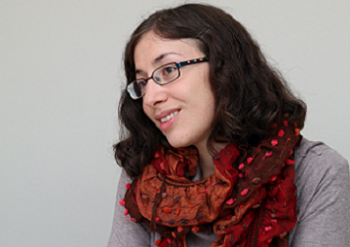
Photo Gallery
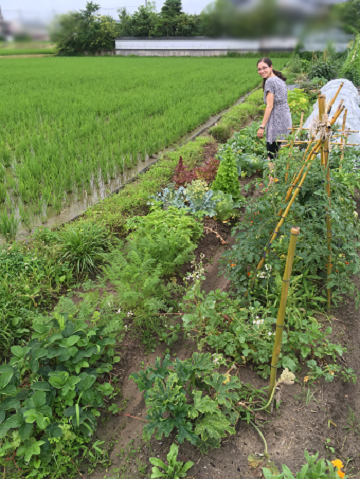
Our small vegetable garden in Saijo. We can grow a lot even in a small space!
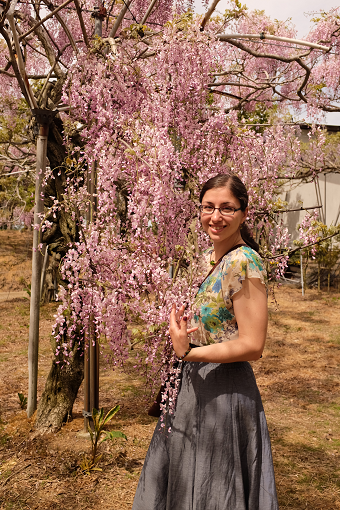
Admiring wisteria flowers in Sera
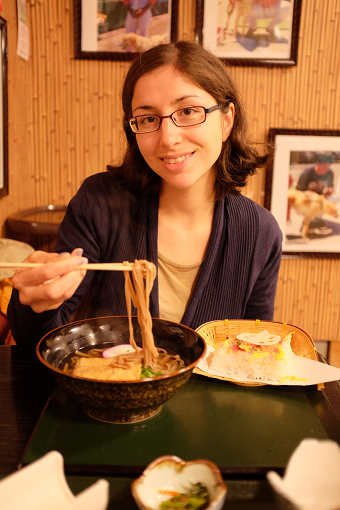
Enjoying some simple but delicious food in Iwakuni
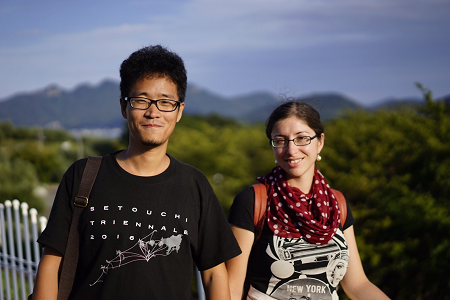
Visiting the Setouchi Triennale with my fiancé Qu Meng. It was an unforgettable experience.
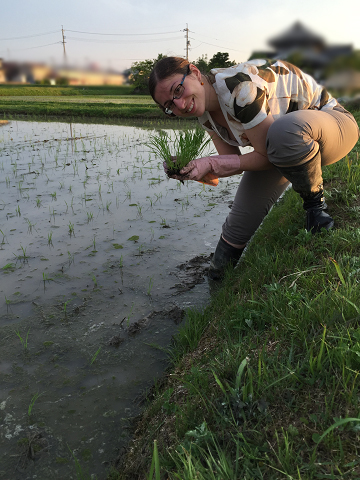
Helping a Japanese family with rice planting in Saijo


 Home
Home